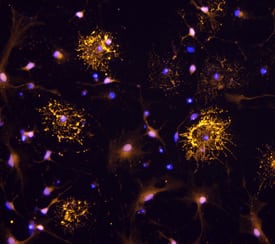Human PLP Antibody
Human PLP Antibody Summary
Applications
Please Note: Optimal dilutions should be determined by each laboratory for each application. General Protocols are available in the Technical Information section on our website.
Scientific Data
 View Larger
View Larger
PLP in Rat Cortical Stem Cells. PLP was detected in immersion fixed 7 day differentiated rat cortical stem cells using Human PLP Monoclonal Antibody (Catalog # MAB6310) at 10 µg/mL for 3 hours at room temperature. Cells were stained using the NorthernLights™ 557-conjugated Anti-Mouse IgG Secondary Antibody (yellow; Catalog # NL007) and counterstained with DAPI. Specific staining was localized to oligodendrocytes. View our protocol for Fluorescent ICC Staining of Cells on Coverslips.
Reconstitution Calculator
Preparation and Storage
- 12 months from date of receipt, -20 to -70 °C as supplied.
- 1 month, 2 to 8 °C under sterile conditions after reconstitution.
- 6 months, -20 to -70 °C under sterile conditions after reconstitution.
Background: Myelin PLP
Proteolipid protein (PLP; also lipophilin) is an abundant, 277 amino acid, 24-25 kDa integral membrane molecule that is specific to CNS myelin. It is a four transmembrane domain protein that contributes to the multilaminar structure of myelin. Structurally, both the N- and C-termini are cytoplasmic, and the molecule likely forms oligomers on the cell surface. Mutations in the gene for PLP are associated with CNS dysmyelination and abnormal oligodendrocyte death in mice, and Pelizaeus-Merzbacher disease in human. It is proposed that PLP point mutations result in improper protein folding with subsequent intracellular retention. A mouse monoclonal antibody termed O10 has been developed that is directed against a novel cell surface epitope of PLP. O10 belongs to the IgM subclass, and marks a cell-specific, denaturation-sensitive epitope that appears late in the oligodendrocyte differentiation. This epitope does not appear to be a carbohydrate, but instead a peptide segment that appears after proper molecule folding. The O10 antibody does not recognize mutated PLP, and thus may serve as an assay for the presence of functional PLP. PLP demonstrates one splice form of 20 kDa that shows a deletion of aa 117-151 (in both human and mouse). This isoform, termed DM20, is recognized by O10.
Product Datasheets
FAQs
No product specific FAQs exist for this product, however you may
View all Antibody FAQsReviews for Human PLP Antibody
There are currently no reviews for this product. Be the first to review Human PLP Antibody and earn rewards!
Have you used Human PLP Antibody?
Submit a review and receive an Amazon gift card.
$25/€18/£15/$25CAN/¥75 Yuan/¥2500 Yen for a review with an image
$10/€7/£6/$10 CAD/¥70 Yuan/¥1110 Yen for a review without an image

